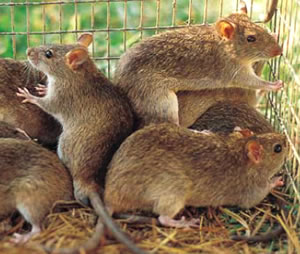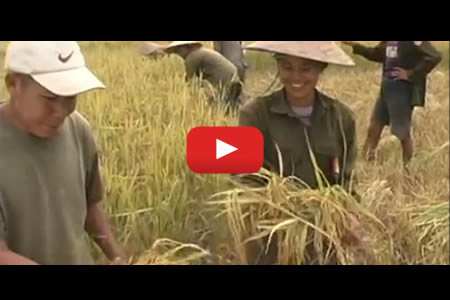Management of rodent in storage
 What are rodents?
What are rodents?
Rodents are rats and mice. The three most important rodent species in rice storage are:
- Black rat or House rat (Rattus rattus),
- Norway rat or Common rat (Rattus norvegicus), and
- House mouse (Mus musculus).
Why is managing rodents in storage important?
Feeding on stored produce
Rats consume about 25 g of food per day and mice eat approximately 3–4 g per day. They contaminate a lot of the stored produce with urine, feces, hair, and pathogenic agents. Infested batches often have to be declared unfit for human consumption. As rodents mainly feed on the embryo, they cause particular damage to the nutritional value and germination ability of seeds.
Damage to material and equipment
Rodents damage tarpaulins, bags, pallets, sprayers, and the store itself (cables, doors). These often lead to subsequent damage such as produce leaking out of bags or containers, bag stacks collapsing, sparks or fire from short circuits, silos and warehouses subsiding or even collapsing as a result of being undermined, and drainage canals around a store being damaged.
Management options
Preventive measures
The most favorable factors for the rodent occurrence are:
- Sufficient supply of food
- Protected places in which to build burrows and nests in
- Hiding places
- Access to produce
Good store management and preventive measures taken as part of an integrated control program help to deal with these factors.
Keeping rodents out
The requirements of preventive rodent control must be taken into account whenever new stores are being built. Particular attention should be paid to doors, ventilation openings, brickwork, and the junctions between the roof and the walls. Repair any damage to the store immediately. This applies especially to the doors.
Storage hygiene and technical measures
- Keep the store absolutely clean. Remove any spilt grain immediately.
- Store bags in tidy stacks set up on pallets, ensuring that there is a space of 1 m all around the stack.
- Store any empty or old bags and fumigation sheets on pallets and, if possible, in separate stores.
- Keep the store free of rubbish in order not to provide the animals with any places to hide or nest. Burn or bury it.
- Keep the areas, surrounding the store, free of tall weeds so as not to give the animals any cover, they have an aversion to crossing open spaces.
- Keep the area in the vicinity of the store free of any stagnant water and ensure that rainwater is drained away, as it can be used as source of drinking water.
For more information:
Visit the Rice Knowledge Bank website (http://www.knowledgebank.irri.org), email postharvest@irri.org; or call +63 2 580 5600.







